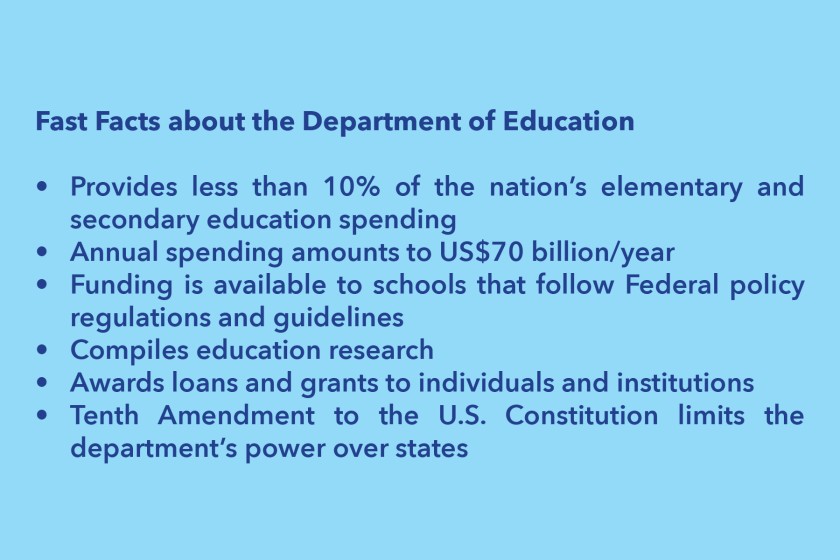In 1980 when I was in sixth grade, the inside of other kids’ school lockers bore posters of Bo Derek and Shaun Cassidy. My heartthrob poster? U.S. President Jimmy Carter (D). (Okay, I was a politics nerd.) President Carter was—and continues to be—my hero, and last summer I finally was able to “meet” him in Austin, Texas, during his A Full Life book tour.

The Equal Access Department
Ever-overlooked for his administration’s many accomplishments, Carter’s creation of the Department of Education endures as evidence of his influence while in office. The effort simply reorganized disparate existing Federal educational programs, but Carter’s major force fueling the department’s inception was equal access to education.
The Department of Education’s mission: “To promote student achievement and preparation for global competitiveness by fostering educational excellence and ensuring equal access.”
On the day Carter signed the Department of Education bill (S.210) into law in 1979, he called out those who helped him pass this legislation–“groups devoted to educational quality and equal educational opportunity.”

Carter made it clear in the speech that decisions concerning public education should be carefully balanced between local and Federal officials. He went so far as to echo current-day conservatives by stressing that local control over schools be a primary goal.
However, in his remarks Carter does further compel the Federal government to step out of its “part-time” role of ineffectiveness and begin assisting local school systems on a fully committed basis.
There’s the Rub
For Republicans, Carter’s establishment of the Department of Education was the worst thing that ever happened to our nation’s schools. In their view, the Federal government wields supreme power over our local school districts, tearing at the community fabric that makes each school district unique and infringing on states’ rights, a common conservative refrain and a relic borne out of America’s civil rights struggles.
What the Election Means for Equal Access
The outcome of the upcoming 2016 U.S. Presidential election has the potential to widen or contract the divide that exists between high- and low-performing public schools. The future of the Department of Education comes down to those who want to preserve departmental programs and those who want them abolished. And it cuts right down party lines.
Listen carefully to this year’s slate of candidates, and you’ll pick up hints of how each plans to “fix” public education.
Republican Candidates’ Takes on Education

John Kasich
“[Kasich] has…reinforced that education is a local responsibility, not one to be micromanaged by federal bureaucrats.” [johnkasich.com]

Donald Trump
“We’re getting rid of Common Core…it’s going to be gone. There won’t be education from Washington, D.C.; there’ll be education locally.” [facebook.com/DonaldTrump/videos]

Ted Cruz
“Despite its stated aim to bring equal access to all, [the department] has failed to close the gap between low-income communities and other communities, and instead has led to one-size-fits-all solutions imposed on millions of students with differing educational needs. Eliminating the Department of Education not only restores the states’ constitutional power and saves taxpayers billions of dollars, it returns decision-making to parents and local communities. The growing [F]ederal role in education spurred by the Education Department has led to perverse mandates such as Common Core and counterproductive laws such as No Child Left Behind.” [tedcruz.org]
And the Democrats?
Back in the 1970s, when Carter’s Department of Education bill came up for debate in Congress, many liberal Democrats were critical of it, seeing it as a threat to the enforcement of civil rights. Despite that, the measure ultimately passed with support from both liberals and conservatives.
Today, while on the trail, the current Democratic candidates make little to no specific mention of the department—especially to defend it. But the crux of its existence—the importance of equal access to education—is frequently referenced by both Hillary Clinton and Bernie Sanders.

Hillary Clinton
“Hillary believes that every child, no matter his or her background, should be guaranteed a high-quality education.” [hillaryclinton.com]

Bernie Sanders
“I believe guaranteeing resource equity is a core tenet of the [F]ederal government’s role in education policy, and if elected, I will work to reduce the resource disparities that currently exist between schools in wealthy and low-income areas.” [feelthebern.org]

A Necessary Evil?
Although threatened with elimination multiple times starting with then-Presidential candidate Ronald Reagan (R) in 1980, to Presidential candidate Rick Perry (R) who continues to try and live down his infamous “Oops” moment in 2011 when he failed to remember the third Federal agency (along with Education) that he sought to eliminate, the department lives on.
Persistent educational inequity in our country appears to spoil the rationale for the drastic step of shutting down the Department of Education.
Your Thoughts?
Do you think that until educational equity is achieved on a national scale, there will always be a need for the Department of Education?

One thought on “Why Campaign ’16 Puts Dept of Education Back in the Political Crosshairs”